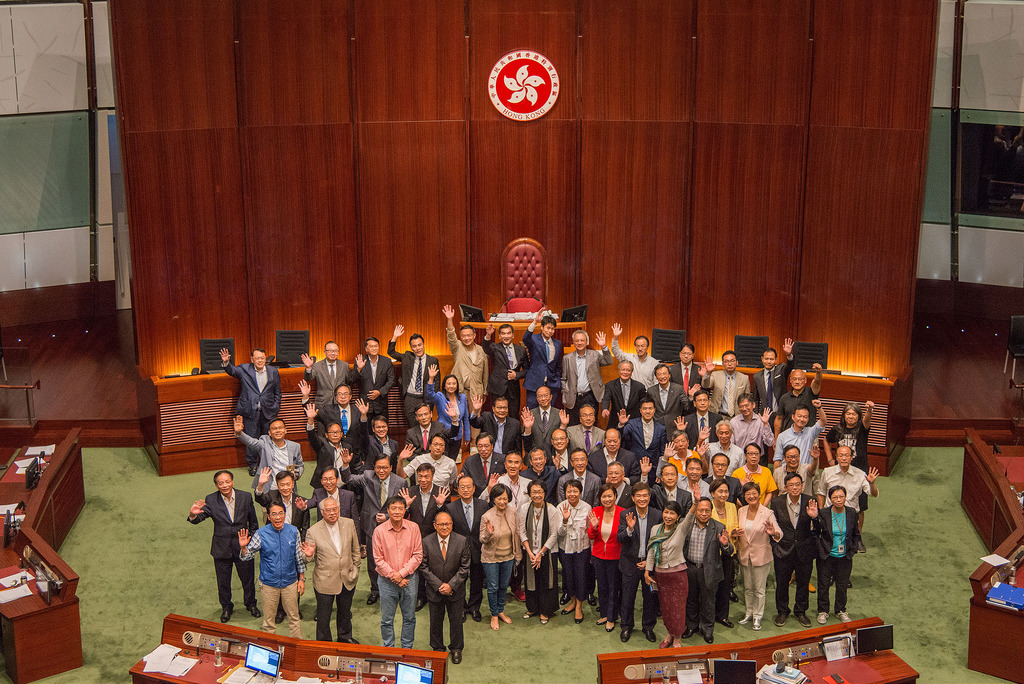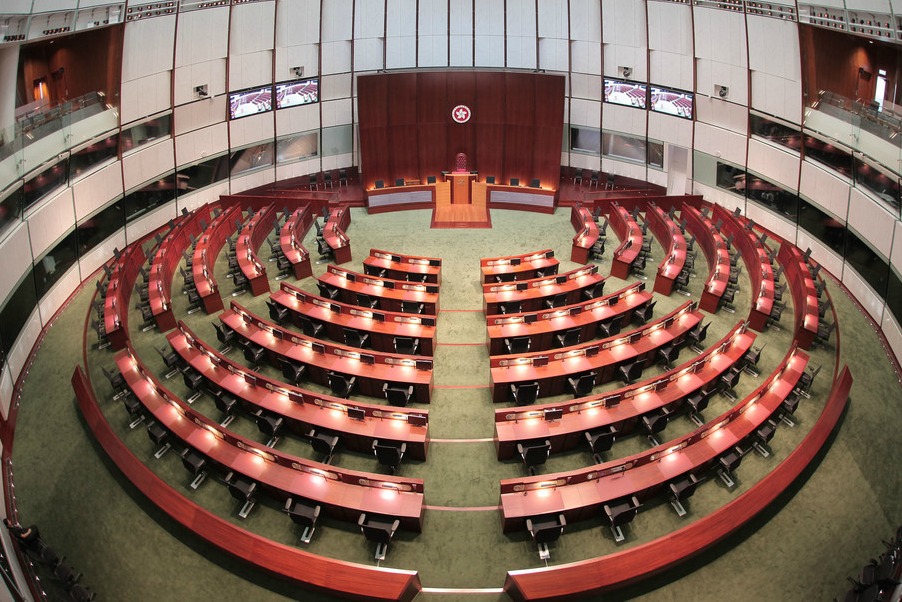You’ve undoubtedly seen loads of coverage of the just-passed LegCo election: but what exactly is the legislative council, and how does it work? With that in mind, we’ve put together the ultimate guide to LegCo that will help you nail down the basics in no time.
What is LegCo?
LegCo, short for Legislative Council, makes up Hong Kong’s legislature, the law making branch of the government. It currently comprises 70 members and is semi-democratically elected – 35 of which are directly elected by geographical constituencies and 35 of which are indirectly elected by functional constituencies (we’ll go through these later).

Members of LegCo. Photo: LegCo
The first LegCo was established in 1843 under British rule as a colonial legislature. The current council is the fifth LegCo of Hong Kong, and its term started on October 1, 2012 and will continue until September 30, 2016, after which the just-elected sixth council will take office. Over the past century and a half, the legislature has gone through many changes, evolving from a purely advisory body to a legislative body that now has multiple powers and abilities to check the executive branch.
LegCo is a unicameral legislature, meaning instead of having two chambers like the U.S. Congress, LegCo has one. It has a lengthy list of powers – to see those, go to Article 73 in Basic Law, Hong Kong’s constitution. Important powers include enacting, amending and repealing laws, as well as approving taxation and public expenditure, just to name a few. LegCo also has the power to monitor and question the work of the government, and can even appoint or remove judges and impeach the Chief Executive.

Photo: Wikipedia
Committees
Committees play an essential role in ensuring that LegCo functions efficiently. Numerous committees exist in LegCo, but the three permanent standing committees that regularly meet are the Finance Committee, the Public Accounts Committee and the Committee on Members’ Interests.

Public Accounts Committee visits the Shine Skills Centre at Pokfulam. Photo: LegCo
Another important committee – the House Committee – takes care of matters relating to business and scrutinises bills and subsidiary legislation. Within every committee also exists subcommittees, so that work can be divided efficiently and assigned to specific field expertise, as members of subcommittees are well-versed in their areas.
How Does a Bill Become Law?
The law-making process in Hong Kong is a rather long and complex one, so don’t hold your breath. Nonetheless, it’s still straightforward enough to understand.
A bill must first be introduced to LegCo, which only the Government and members of LegCo can do. Before being introduced to LegCo, the bill is published in the Gazette, the Hong Kong Government’s official publication. Afterwards, it is heard in the first reading, which usually consists of the Clerk reading a short title.

The Hong Kong Gazette Vol. 1 No. 1 published May 1, 1841. Photo: Wikipedia
The bill is then moved to the second hearing where the debate is usually adjourned to the House Committee, which decides whether a Bills committee should be formed to study the bill in further detail.

House Committee at work. Photo: LegCo
If a bill did not require a Bills Committee to be formed for further scrutiny or if it has finished being examined by it, then the second hearing debate will resume at a following meeting. A vote is then taken by the council to decide whether the bill should proceed any further, and if it does, it will move on to a committee of the whole council.

Gif: Socialitelife
Yes… there. Is. More. At this stage, the Committee must go through and vote on each clause and amendment of the bill. It is at this point that the bill will be held for the third reading, and finally, the Committee will vote either for or against the bill to be submitted to the Chief Executive to be signed.
After it’s signed, the bill is declared in the Gazette, becoming official law. It’s then reported to the Standing Committee of the National People’s Congress in Beijing to be recorded. AT LAST. FINALLY. Sorry you had to go through that, bill.
Phew.
Constituencies
After all this talk about LegCo and what it does, you may be wondering how one gets to be a member. Members are elected through constituencies, which are either functional or geographical.
The 5 geographical constituencies are Hong Kong Island, Kowloon West, Kowloon East, New Territories West and New Territories East. Permanent residents that live in each of these areas can vote for their legislators.
On the 21st of January 2010, five pan-democrat legislators resigned from each of the five geographical constituencies, triggering a by-election named the “Five Constituencies Referendum”, in which all Hong Kong citizens could participate.

Five legislators that had resigned at a rally on January 27, 2010. In no order: Albert Chan (NT West), Leung Kwok-hung (NT East), Wong Yuk-man (Kowloon West), Alan Leong (Kowloon East), Tanya Chan (HK Island). Photo: Wikipedia
Although referenda is not allowed by the Basic Law of Hong Kong, the five legislators hoped that in doing what they did, they would be able to support their aims for Hong Kong electoral reform and go against what they thought was unfair at the time.
Functional constituencies, unlike geographical constituencies, represent different industries and interest groups in Hong Kong. Some examples include Agriculture and Fisheries, Insurance, Transport, Education and Health Services, to name a few.
Contrary to geographical constituencies where all citizens can vote for its members, only people of respective industries are allowed vote for members of the functional constituencies.
Annnnndd, that’s a wrap. You now know enough about LegCo to understand the recent election, or even the next major protest (how utterly shocking would it be to have another one of those soon, right).

Gif: Popkey





Reader Interactions